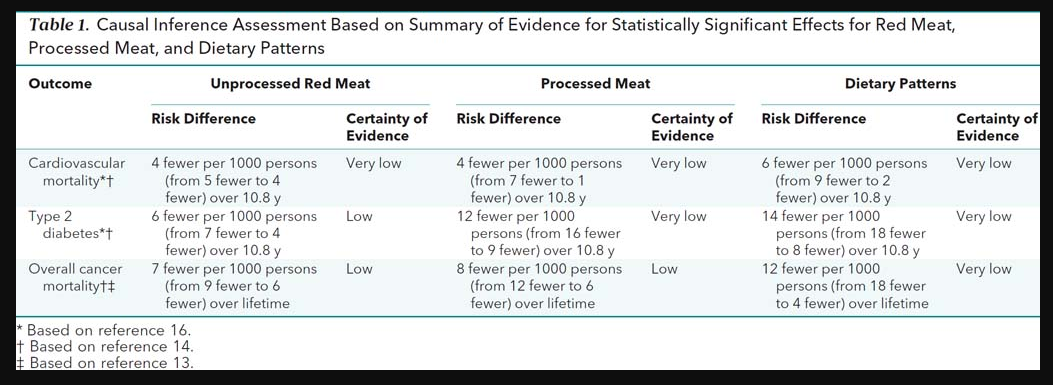Red meat. Is it something you should be eating or avoiding? Is it healthy or is it harmful? How much can you get away with eating, if any at all?
I want to help you get to the bottom of what red meat means for your health.
I’m not sure if you have seen this, but there are a lot of news stories lately calling into question the concerns around red meat.
At the same time, we’ve seen other stories touting the potential benefits of red meat — I can understand how that might be confusing, so let’s talk about it.
My Perspective On Red Meat
To be frank, I have no agenda when it comes to red meat.
I tried for years to embrace a vegan or vegetarian diet because a lot of the arguments for either really resonates with me. This is especially true for both ethical and environmental reasons.
In terms of the health argument, though, I do see a lot of strong evidence toward the benefit of plant-based foods, but not the harm of animal foods.
My personal health does a lot better with a plant-based diet, that includes healthy versions of animal protein daily.
I enjoy some red meat, probably around several times per week, but it is not a daily staple of my diet.
The Inspiration For This Article
So, why are we talking about red meat at all, and why now?
A recent meta-analysis that went viral concluded that we have no clear evidence about red meat being harmful. The data that we had before didn’t really show any significant effects, and it was not strong enough evidence in general.
Ultimately, they suggested that any recommendation to change one’s red meat intake did not have a strong basis in fact.
From many in the health community, this received a strong amount of pushback. So, I really wanted to explore both sides, and all the relevant data, to help you make the right choice.
Breaking Down Red Meat
When it comes down to it, meat can be a high source of many important nutrients.
Let’s consider something like a 3.5-ounce (100-gram) portion of raw ground beef (with 10% fat), which contains:1
- Vitamin B3 – 25% of the RDA (Read More: All About B Vitamins)
- Vitamin B12 – 37% of the RDA (this vitamin is unattainable from plant foods)
- Vitamin B6 – 18% of the RDA
- Iron – 12% of the RDA (this is high-quality heme iron, which is absorbed much better than iron from plants)
- Zinc – 32% of the RDA
- Selenium – 24% of the RDA
- Plenty of other vitamins and minerals in smaller amounts
In addition, you’ll find upwards of 25 or more grams of quality protein. This is a fairly well-absorbed, high-quality protein, which is rich in essential amino acids.
Key Insight: These are all important nutrients, and often are ones that we can run short in, so it is important to be able to get them from a reliable source.
Exploring Relevant Data On Red Meat
Some studies have explored a link between meat intake and the risk of:
- Diabetes (Read More: Are You At Risk For Diabetes?)
- Heart Disease
- Early Death
But, other studies suggest that this only applies to processed (not unprocessed) meats. This would include smoked and cured meats, like bacon and sausage.
The difficulty here is that while some studies show that those who eat red meat are at a greater risk of developing cancer, the findings end up being inconsistent. Larger reviews looking at the evidence as a whole show that the data itself is a bit weak.
Overall, some have argued that the main evidence is observational. And, for that reason, observational studies cannot be used to determine cause and effect. While it shouldn’t be dismissed, it shouldn’t be the sole determinant of outcomes.
One of the major pitfalls here is that, focusing on one of the largest observational studies, did not correct for known variables that could contribute to the outcome.
Specifically, many who have diets that are high in red meat tend to have other risk factors at play. People who eat the most red meat, in general, are also more likely to be:
- Male
- Older
- Less active
- Consuming more processed foods
- Lower in education
- Lower in socio-economic status
- A user of tobacco
When you collect all of these together, they are compounding variables. As more studies work to correct for these variables, and their associated risks, the smaller the effect size seems to be from red meat alone.
Bottom Line: We don’t see the same effect from red meat alone, once we correct for the compounding variables that exist in those suffering from the above symptoms and diseases.
Understanding “Control” Groups
In science, our “gold standard” has always been a randomized, placebo, controlled study.
This is for a very good reason. Whenever we can do it, it ends up being more helpful, more accurate, and differentiates a lot of other compounding variables that may get in the way of real, actionable insight to help the public at large.
Think about it like this: in studies like these, people are randomly put into groups. One group eats what we’ll call “Diet A,” while the other group eats “Diet B.”
Then, researchers follow those people and see which diet is more likely to lead to a particular outcome. For our discussion today, there have been several randomized controlled trials that have examined the health effects of red meat.
A few studies even investigated the effects of red meat on risk factors for heart disease.
Exploring The Data

We have had a couple studies that weren’t blinded, but were interventional, where groups were given specific diets and other groups were not.
Interventional Studies
In those interventional studies, what we have seen has been rather surprising. Those have shown that swapping out red meat for poultry or fish doesn’t really seem to have an effect on blood lipids (cholesterol and triglycerides).2
Another study that was done, another interventional example, showed that meat did have more of a benefit than other foods for helping with muscle growth (in women who are exercising). They ended up with more favourable composition.3
If that one did control for protein, it likely would have been more impressive, but they did show that, per calorie, meat had a stronger benefit than other food types.4
Then, there was a study that may surprise some folks out there. It found that red meat intake lowered inflammatory marker IL-6.5
Key Insight: Keep in mind that all of these studies examined lean red meat. To date, no studies have examined the health effects of high-fat red meat.
While there have not been very many, those are some of the data points that we have been able to get from interventional studies.
Observational Studies
On the other hand, we have had a long history of observational studies when it comes to red meat intake.
These have often found higher risks for:
- Chronic Disease
- Cancer
- Early Death
That said, the more thoroughly they control for certain variables, the weaker that data becomes. Also, by and large, there is not a lot of control that goes into these studies.
This means that the red meat itself isn’t filtered based on:
- Grass-fed Meat
- Organic Meat
- Highly Cooked or Burned
Bottom Line: A lot of these variables can have a dramatic effect on the results and what it means for our overall health. Let’s explore that through the prism of the latest data we can find.
The Most Recent Meta-analysis
Let’s start by referencing the image below…

This shows some of the data from the most recent round of analyses that has gone into understanding the effect red meat can have on our health.
In terms of cardiovascular mortality, what they found was that for every 10.8 years, there may be 4-5 fewer deaths per 1000 people. So, while it is not a guarantee that 4 people will not die, but 4 fewer people have died.
The argument here concerns the certainty of the above statement. Basically, would it truly help to lower red meat intake by 3 servings per week?
There is an inherent risk in everything, like getting struck by lighting, but how does that risk relate to the level of certainty we can connect to it?
To put that in practice, let’s say that if you lowered your intake by 3 (from 4 to 1 or 7 to 4), there is a likelihood that 4 fewer deaths will occur out of one thousand people in a decade.
Given all the variables we mentioned before, though, researchers overall found that the certainty here was quite low. With so much ambiguity surrounding it, there isn’t enough data to make a confident statement.
Key Insight: So, while there may be risks, researchers determined that people should have the opportunity to choose what is right for them (based on variables and the quality of choices they make).
Your Overall Takeaway On Red Meat
The thing you should know is that there may be some health risks when it comes to eating red meat.
But, we don’t have strong enough data to parse through that statement to make it with a higher, or more specific, level of confidence.
On the other hand, there are things in red meat that are hard to get elsewhere (nutrients and protein), and these things can be beneficial.
As far as the health effects, though, any potential harm is both unclear and not currently strong.
While I would argue for going the route of “cleaner” versions of meat, those that are leaner and have less overall fat.
That’s because the fat portion does not contain any essential nutrients. There are trace amounts of omega-3 fat in grass-fed meat, but not enough to make a real difference.
Key Insight: The fat is not the source of any nutrients that are essential, but it does have the strongest correlation with the negative outcomes.
So, you should consider going with leaner types of red meat that are not highly charred and not burned. That’s because there is data connecting negative outcomes to meat cooked at extremely high temperatures.
The Final Word On Red Meat
As long as you choose unprocessed and preferably grass-fed red meat, make sure to use gentler cooking methods and avoid burnt/charred pieces, there is likely nothing to worry about.
In fact, properly cooked red meat is likely very healthy. Especially when eaten in the context of a diet high in legumes, fruits, vegetables, and intact whole grains.
It’s highly nutritious and loaded with healthy proteins, healthy fats, vitamins and minerals, along with various nutrients known to positively affect the function of both your body and brain.
Key Insight: This does not include the ethical or environmental concerns that stem from consuming red meat. That’s something I think you should keep in mind after our discussion today.
What I’m Really Excited About…
When it comes to the future of meat, I am really excited by the prospect of what we know as “clean meat.” This is cultured meat that is created in a lab and is entirely divorced from consuming animals.
It wouldn’t be fake, genetically modified, or anything like that, it would be the same as beef without any of the ethical drawbacks that come with it.
I have profiled this novel concept before, and how we may be closer than we think to reaching that point. Please, if you’re interested, have a read right now (Read More: Why Clean Meat Might Be The Future).
Your Diet, Your Thyroid, Your Health
If you’ve ever been concerned about your health, I want to help you put together a plan to get things in order and to start feeling in control.
It all starts with a very simple quiz to figure out how your thyroid is performing, and how it could be performing better. Take the Thyroid Quiz today (Click Here: Take The Quiz Now) to learn more and to find your best health.
Resources
1 – http://nutritiondata.self.com/facts/beef-products/6193/2
2 – https://www.ncbi.nlm.nih.gov/pubmed/27881394
3 – https://www.ncbi.nlm.nih.gov/pubmed/22836072
4 – https://www.ncbi.nlm.nih.gov/pubmed/24477043
5 – https://www.ncbi.nlm.nih.gov/pubmed/24477043

1. Schedule a Thyroid Second Opinion with me, Dr. C, Click Here for Details
2. Download and use my Favorite Recipes Cookbook Here
3. Check out my podcast Medical Myths, Legends, and Fairytales Here
Dr. Alan Glen Christianson (Dr. C) is a Naturopathic Endocrinologist and the author of The NY Times bestselling Adrenal Reset Diet, The Metabolism Reset Diet and The Thyroid Reset Diet.
Dr. C’s gift for figuring out what really works has helped hundreds of thousands of people reverse thyroid disease, lose weight, diabetes, and regain energy. Learn more about the surprising story that started his quest.


